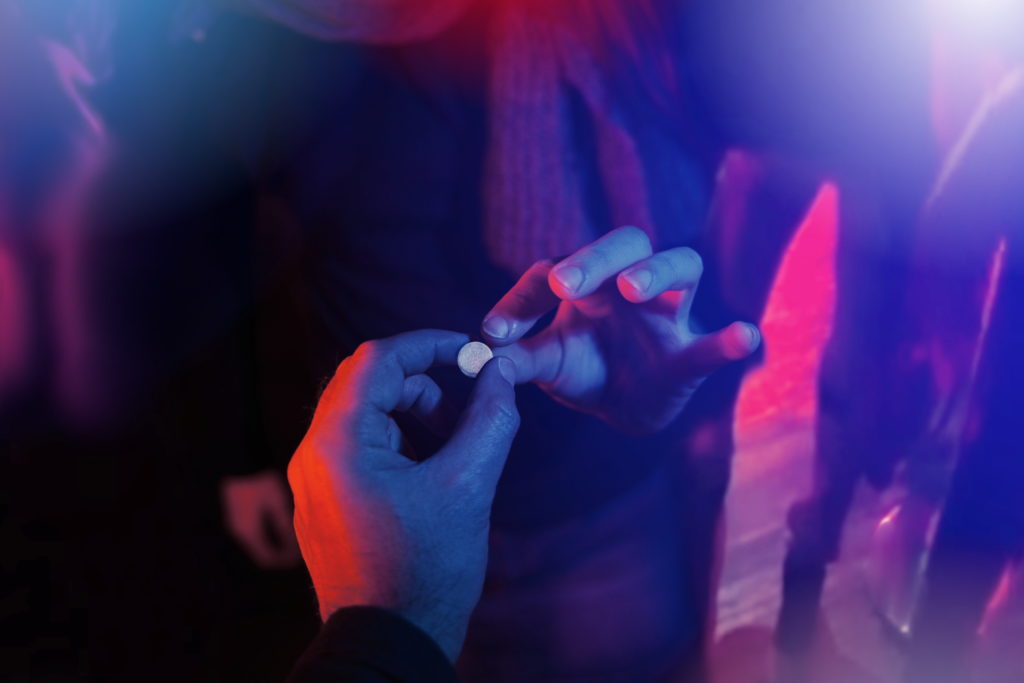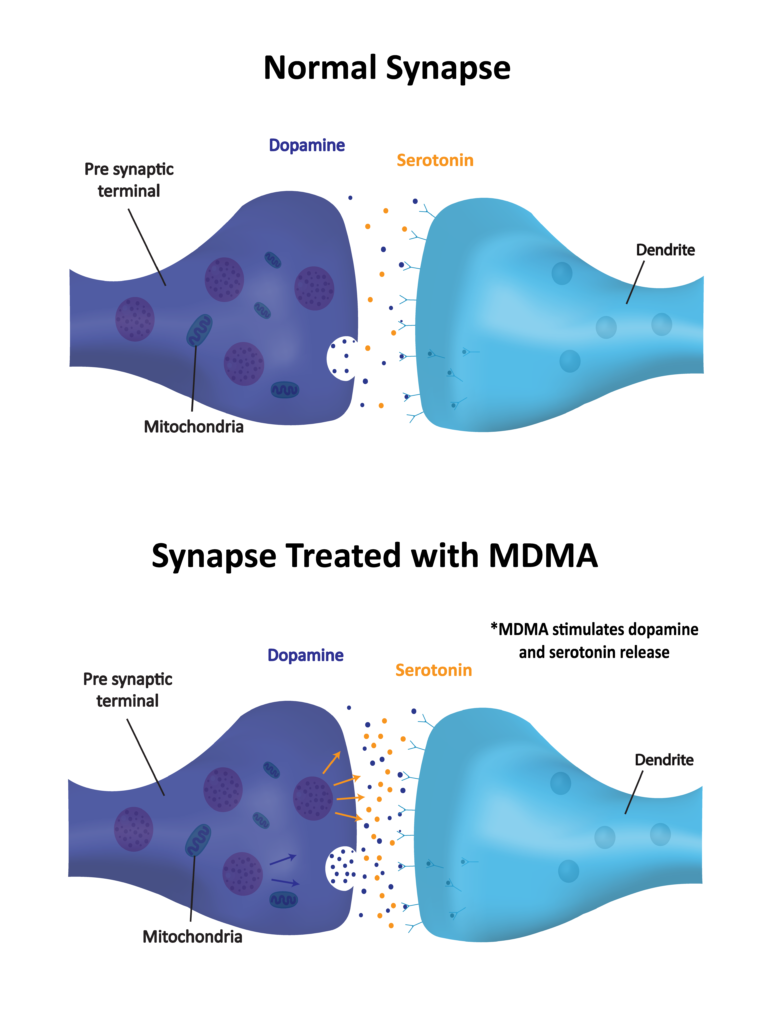MDMA ADDICTION TREATMENT
Sections: What is MDMA? | Developing An Addiction | Effects | Signs & Symptoms | Withdrawal | Treatment | Hope
What Is MDMA?
| HELPFUL ARTICLES |
| Signs of MDMA Addiction |
MDMA—also known as ecstasy or molly—is a mood-altering drug that is usually taken to induce pleasurable feelings of warmth, energy, and overall positivity. Known for being prevalent at raves and nightclubs, MDMA can also be considered a “club drug.” It is often taken socially with others in an effort to boost the group’s enjoyment of dancing, listening to music, etc.

The drug can be taken in a variety of different forms:
- Liquid
- Capsule
- Tablet (Ecstasy)
- Crystalline powder (Molly)
MDMA has been used previously in very specific therapeutic applications, but there are currently no accepted medical uses for the drug. Unfortunately, some practitioners—particularly in “new age” or spiritual communities—still use MDMA in unsubstantiated therapies or in an effort to enhance spiritual/religious practices. Such uses are still considered illegal in the United States.¹
Is MDMA addictive? Absolutely, and frequent use of the drug increases the chances of addiction.
HOW A PERSON DEVELOPS AN MDMA ADDICTION
Especially in the case of “party drugs” like MDMA, friends and family of addicted individuals often see their drug use as a habit perpetuated by a selfish desire to feel good and ignore responsibilities. However, drug addiction is a medically recognized disease with a documented physiological cause. MDMA directly alters brain chemistry, which can create an intense chemical dependency. And because MDMA is addictive in this way, a person in its grip cannot simply make the choice to stop taking the drug.

THE EFFECTS OF MDMA ON THE BRAIN AND BODY: HOW DOES IT WORK?
The ways in which MDMA affects brain chemistry have actually been fairly well documented. The drug produces the pleasurable effects it does by interfering with the regulation of three of the brain’s most critical neurotransmitters: serotonin, dopamine, and norepinephrine.
MDMA molecules bind to the proteins that transport these neurotransmitters across the gaps between brain cells, ultimately changing the concentration of each chemical in the brain.¹ It is this change in brain chemistry that can turn seemingly harmless recreational use into a physiological addiction.
MDMA can create the following short-term effects:²
- Increased energy
- Euphoria
- Feelings of warmth and empathy toward others—even strangers
- Increased touch sensitivity
- Sensory distortions
- Mixed perceptions, hallucinations (seeing colors and patterns in music, etc.)
- Increased enjoyment of music, dancing, sex, etc.
The effects of ecstasy last approximately 3-6 hours, on average.
HOW ADDICTIVE IS MDMA?
MDMA is considered to have a lower potential for addiction compared to substances like nicotine, alcohol, opioids, and cocaine. However, it is important to understand that this does not mean MDMA is non-addictive or safe to use recreationally without risks.
Factors Influencing Addiction
Is MDMA addictive to all users equally? There are several factors that influence an individual’s vulnerability to this type of drug abuse.
- Social and Environmental Context: The environment in which MDMA is used can influence its addictive potential. Its recreational use in party or festival settings might limit consumption to those occasions, unlike substances that are used more regularly in a variety of settings.
- Individual Susceptibility: Genetic, psychological, and social factors can make certain individuals more prone to substance use disorders, such as addiction to ecstasy pills. People with a history of addiction or mental health issues may be at higher risk.
Make no mistake—MDMA is addictive, and people often have serious difficulty overcoming molly/ecstasy abuse.
NOTABLE SIGNS & SYMPTOMS OF MDMA ADDICTION
When taken regularly over the long term, the pleasant effects of MDMA begin to be tainted by the negative repercussions on a person’s physical and mental health. The following are just a few common physical, mental, and behavioral MDMA addiction symptoms that may be present:
- Bouts of nausea
- Clenching of teeth
- Vision problems
- Sweating and chills
- Insomnia
- New or worsening anxiety and/or depression
- Poor memory and attention
- Lack of interest in sex
- Impulsive or aggressive behavior
- Loss of appetite (may be indicated by sudden weight loss)
- Organ damage or failure (heart, kidneys, liver)
MDMA WITHDRAWALS: WHAT TO EXPECT
Within a few hours after a person with a chemical dependency on MDMA stops taking the drug, he or she will begin to experience a variety of distressing and potentially dangerous side effects. The following are just a few of the physical, mental, and behavioral symptoms of ecstasy withdrawal:
- Muscle aches
- New or worsening depression, anxiety
- Intense, obsessive cravings
- Dizziness, fatigue
- Grinding of teeth, jaw soreness
- Flashbacks to previous “trips”
- Confusion, fear
- Memory loss
- Suicidal thoughts and feelings
- Diarrhea, constipation
- Lack of appetite
- Irritability, aggression
- Psychosis (can be permanent in severe cases)
THE IMPORTANCE OF PROFESSIONAL MDMA ADDICTION TREATMENT
The intensity of MDMA withdrawal symptoms can vary significantly from person to person, depending upon the frequency of use, the dosage taken, and the overall health of the individual. While it may be tempting to simply lock yourself or your loved one into a room until the addiction is broken, the attempt is unlikely to be successful and can even be life-threatening.

If you or a loved one are struggling with an addiction to MDMA, it is important that you immediately seek help from a trusted MDMA addiction rehab facility. At a professional drug rehabilitation center, those struggling with drug addiction can receive effective treatment from expert staff in a safe, comfortable environment.
Upon admission, clients still struggling with chemical dependency will first undergo an MDMA detox period, during which they will be carefully monitored by a medical team experienced in the treatment and mitigation of withdrawal symptoms. If an emergency should arise, doctors and other staff will be available 24/7 to provide immediate care.
Once the client is no longer in the grip of ecstasy addiction and is medically stable, he or she will begin working through the mental, emotional, and behavioral aspects of addiction in a residential treatment program. Typically, residential programs require clients to remain on-site for the duration of treatment, after which they will be able to return home or enter an outpatient program for additional recovery support.
If the client is no longer physically addicted and does not need to go through MDMA detox, he or she may be a good candidate for an outpatient or intensive outpatient (IOP) program. These programs allow clients to come and go from the facility as needed, making it possible for them to continue working, going to school, and attending to other responsibilities.
FIND NEW HOPE WITH YELLOWSTONE RECOVERY’S MDMA ADDICTION TREATMENT PROGRAMS
Yellowstone Recovery in Southern California is dedicated to helping those addicted to drugs like MDMA break free from dependency and create a practical plan for long-lasting recovery. All of our treatment methods have a strong basis in the science of addiction, which means that clients receive effective, research-based therapies and are always treated with the utmost dignity and respect.
Whatever you call it—MDMA, ecstasy, or molly—it doesn’t have to rule your life. Call us today at (888) 418-4188 and let our addiction experts help you take back control and start living the life you deserve.
Sources
- Treatment Options
- Program Curriculum
- Program Services








